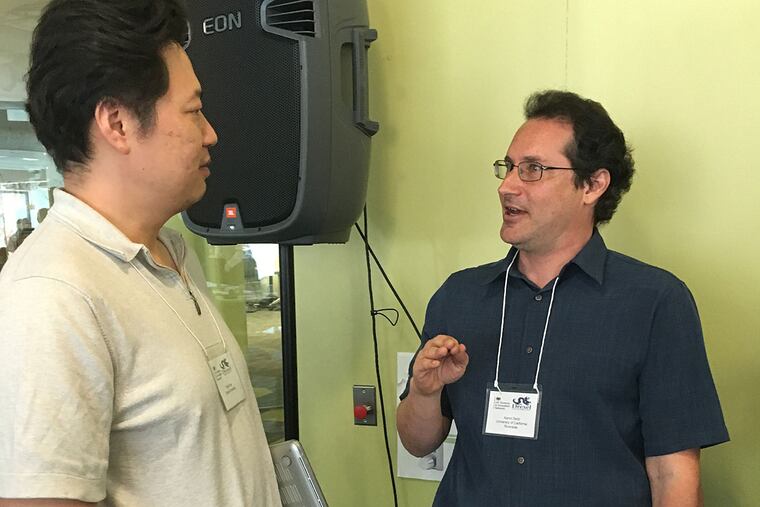Drexel profs play games with Brits to improve health
Here in the U.S., a product developer is politely shooed out the door by a major video game company after proposing a game that helps people recover from a stroke or deal with their cerebral palsy, said health games innovator Pam Kato.

Here in the U.S., a product developer is politely shooed out the door by a major video game company after proposing a game that helps people recover from a stroke or deal with their cerebral palsy, said health games innovator Pam Kato.
In Britain, by contrast, "Serious Games" is a category now being pursued by hospitals and universities, funded with national health grants, earning positive publicity and wide software distribution.
"When I saw that Coventry University even had a building named Serious Health Institute, I knew I was home," said the U.S.-born Kato, who now directs that institute.
Thus explains why literally half of the 22 speakers and participants at the first Serious Games for Health Workshop meeting this week at Drexel's ExCITe Center are Brits. And why the workshop is a joint undertaking of Drexel with the UK Science and Innovation Network and Research Councils UK, "which are looking to export more of their projects."
So relayed conference organizer Frank Lee, executive director of the Entrepreneurial Game Studio at Drexel.
Having lived through its share of calamities, from a terrorist subway bombing to a West End theater collapse, the hospital and medical school at Imperial College London are now going to town with video-game emulations that train staffers and students for major incident response, said Imperial researcher David Taylor.
The simulations can get "very real, very bloody," he admitted.
Virtual- and artificial-reality game technologies that help doctors develop better bedside manners and perform at their best in the OR also loom large at the University of Huddersfield in West York, said digital media and games professor Minhua Ma.
She's also hyper-focused on computer games that nudge young cystic fibrosis sufferers to do their prescribed breathing exercises. They're now happy puffing into a tube controller to create an on-screen "virtual wind" that speeds a pirate ship or pumps up flying dragons "in a game a lot like Angry Birds."
At Cambridge University, professor Barbara Sahakian has earned a reputation with the concept of "gamification" - brain training, on-screen routines that reduce the symptoms of schizophrenia, improve cognitive skills, and help spot the onset of Alzheimer's early on "while drugs can still help," she asserted.
What's happening on this side of the pond?
Video games, not drugs, should be the first response and prescription for kids suffering from ADHD (attention deficit hyperactive disorder), suggested Joaquin Anguera. The University of California-San Francisco neuroscientist showed off the iPad-based spaceship racing game "NeuroRacer" that promotes player focus and multitasking in an entertaining way.
Walt Scacchi from UC Irvine demonstrated one of the first health-focused games - a stroke rehabilitation therapy - to earn the FDA's approval for testing. That's a prerequisite for medical insurance reimbursement.
Ever take a "field test" - "just look into the scope and press the button whenever you see a blinking dot" - to check your field of vision?
UC-Riverside professor Aaron Seitz has been using a similar technology in his vision-training game UltimEyes. It's done wonders, Seitz says, improving the UCR baseball team's record by improving players' concentration and ability to focus on the ball from a distance.
Just one young Philly-based serious games start-up, Enable Games, was at the conference, showing its PC-based Kollect program. Now being tested at area hospitals, this video game encourages young cerebral palsy sufferers to work the body, using a Kinect for Windows V2 sensor device that reads and reacts to their activity.
"With our Internet feedback to a medical team, the game is uniquely customizable, remotely adjustable to the patient's needs, to push them just enough without overdoing it," said Margaret O'Neil, a Drexel associate professor of physical therapy. She is also nursing Enable Games with Drexel game design professor Paul Diefenbach, whom she called "the real wizard behind the project."
215-854-5960@JTakiff